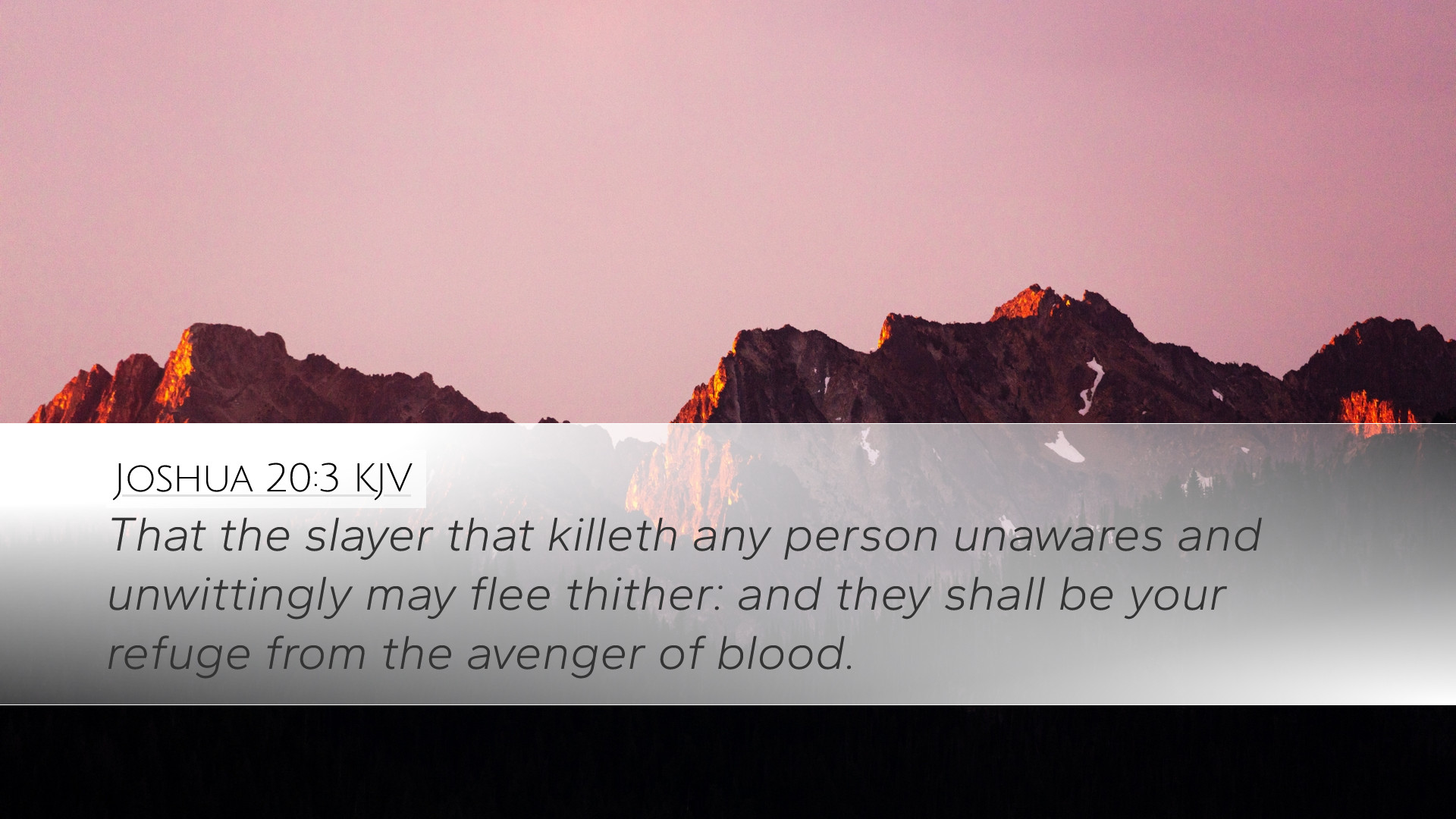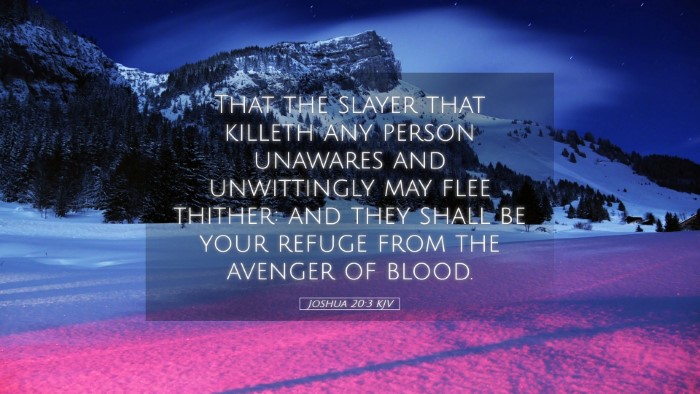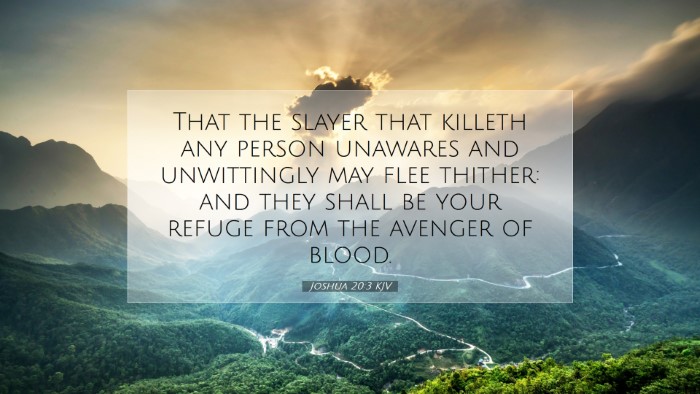Old Testament
Genesis Exodus Leviticus Numbers Deuteronomy Joshua Judges Ruth 1 Samuel 2 Samuel 1 Kings 2 Kings 1 Chronicles 2 Chronicles Ezra Nehemiah Esther Job Psalms Proverbs Ecclesiastes Song of Solomon Isaiah Jeremiah Lamentations Ezekiel Daniel Hosea Joel Amos Obadiah Jonah Micah Nahum Habakkuk Zephaniah Haggai Zechariah MalachiJoshua 20:3
Joshua 20:3 KJV
That the slayer that killeth any person unawares and unwittingly may flee thither: and they shall be your refuge from the avenger of blood.
Joshua 20:3 Bible Commentary
Commentary on Joshua 20:3
Verse Context: Joshua 20:3 states, "That the slayer that killeth any person unawares and unwittingly may flee thither: and they shall be your refuge from the avenger of blood."
Introduction
This verse introduces the concept of cities of refuge, which served as a crucial aspect of judicial mercy in ancient Israelite society. The establishment of these cities designedly addressed the complexities of justice and mercy, reflecting God's character and the societal need for protection and fairness.
Significance of Cities of Refuge
In reviewing Joshua 20:3 through the lens of public domain commentaries, we find a profound illustration of divine provision and societal justice therein. As Albert Barnes remarks, these cities were divinely ordained places where individuals who had committed unintentional homicide could seek asylum, thus preventing the cycle of vengeance that was common in that era.
Adam Clarke expands on this idea, explaining that the cities of refuge were not only physical places but also symbolic of God's mercy. Clarke notes, "These cities were not merely a refuge for the body but also a significant representation of the covenantal guarantee of protection by the Lord." The inclusion of this provision depicts God’s care for both justice and mercy.
Understanding Unintentional Killing
The specific mention of "slayer that killeth... unwittingly" emphasizes the distinction between intentional and unintentional acts. Matthew Henry elaborates on this by suggesting that unintentional acts should be viewed through a lens of compassion rather than impulsive retribution. He states, "We must not allow passion to overshadow justice; mercy must temper the law." This principle reveals the need for discernment in administering justice.
- Compassion: The cities of refuge were established to ensure that those who accidentally committed acts that resulted in death would have a means of escape for their lives.
- Judicial Separation: The avenger of blood, often a family member seeking retribution, must be kept separate from those fleeing to the cities of refuge.
- Process of Justice: The fleeing individual would undergo a process to determine the nature of the act committed, further reflecting the need for deliberate consideration in legal matters.
The Role of the Avenger
Understanding the role of the avenger of blood is crucial in this context, as detailed by Barnes. The avenger operated under the principle of maintaining family honor and justice within the community. However, the cities of refuge provided a legal and godly counterbalance, ensuring that mercy could prevail where mere human emotion might lead to wrongful actions.
Theological Implications
From a theological perspective, Joshua 20:3 reveals deep insights about God's nature as both just and merciful. As Clarke points out, the structure of these refuge cities aligns with the overarching narrative of salvation in the Scriptures, foreshadowing Christ’s role as our ultimate refuge. In the New Testament, Jesus embodies the concept of refuge, offering salvation from the consequence of sin.
- Symbolism of Christ: The cities of refuge serve as a type and shadow of Christ, who offers sanctuary from eternal damnation.
- Grace and Forgiveness: The act of providing a place for the unwitting slayer exhibits God's desire to extend grace and forgiveness, reflecting the heart of the gospel message.
Practical Applications
Today, the principles found in Joshua 20:3 provide critical insights for pastoral care and community support. Pastors and leaders are called to create environments where individuals can find refuge, not only from external judgments but from their internal turmoil as well.
- Creating Safe Spaces: Churches should model the cities of refuge by being places of safety and support for those experiencing unintentional consequences of their actions.
- Encouragement for Forgiveness: Encouraging forgiveness within the community can reflect God’s grace and guide individuals toward healing.
- Equipping for Justice: Having processes in place to discern the truth of situations can help leaders approach conflicts with wisdom and compassion.
Final Thoughts
The establishment of the cities of refuge in Joshua 20:3 is not merely an ancient legal stipulation but a profound instruction on the balance between justice and mercy. As theologians and scholars reflect on this passage, it serves as a reminder of the character of God, who provides both a standard for righteousness and a means for redemption. In an age where judgment often outweighs mercy, the call to embody the spirit of the cities of refuge remains ever relevant.


